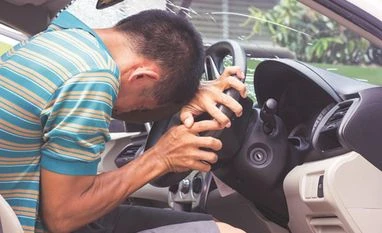For drivers like P Manimaran, life is confined to cabs – whether it is the freezing months of Ooty, when temperatures can hover near zero degree Celsius, or Tamil Nadu’s sizzling summer. As night falls and the tourists he has ferried have retired to their hotels and resorts, Manimaran squeezes into his car to sleep in the parking lot.
It is not the most comfortable bed, but he has no choice. Few hotels or lodges, after all, have a provision for the driver to stay. The Tamil Nadu government hopes to change that.
The state government’s order of June 28 makes it mandatory for hotels and lodges to provide separate bedrooms or dormitories, along with restrooms, on site or within 250 metres of the parking space. The move has come as a huge relief for the drivers of the state’s 500,000-odd registered taxis.
“This is a welcome decision for drivers like me. We just need a clean toilet and a bed to stretch our legs and sleep,” says Manimaran, who belongs to Chennai.
According to Statista, Tamil Nadu has the highest number of taxis in the country, followed by Maharashtra (349,000) and Karnataka (345,000).
The order by the housing and urban development department mandates that the accommodation for drivers be provided either on the premises or within 250 metres of the hotel. The rule states that the hotels and lodges should ensure there is a bed allotted for each parking space and a bathroom for every eight beds.
While drivers and transport companies welcome the move, the hotels that Business Standard spoke to weren’t happy about it. They said that not only will this require additional investment, but it will also be problematic since space is already a constraint in urban areas. The hotels alleged that the government took this decision without consulting stakeholders like them.
“There are a lot of practical challenges in implementing this. Many hotels used to have a dormitory-kind of arrangement, but the drivers would misuse it, playing cards and drinking there. There used to be quarrels, too,” says Sundar Singaram, director of operations of South India Hotels and Restaurants’ Association (Sihra). “City hotels have limited space in the area in front, and an accommodation within 250 metres is impractical,” he adds.
According to Sihra, there are around 10,000 listed and unlisted hotels in Tamil Nadu. If each of these were to spend an average of Rs 200,000, it would require an additional investment of over Rs 200-250 crore for the sector in the state.
“Take the case of a premium hotel like ITC Grand Chola. It has over 600 rooms and may have more than 800 car parking spaces. That means they may have to add as many beds for drivers, too,” says an industry veteran who does not wish to be named.
Singaram adds, “Who will pay for this accommodation: the guest or the taxi companies? They are already charging consumers for overnight stay.” He says that there is no clarity on whether it’s a paid or free service. “We are taking inputs from our members and will be approaching the government soon, raising our concerns,” Singaram says.
Cab companies, meanwhile, are upbeat about the decision and indicate that they are ready to pay for it. “This is a good development. As of now, drivers sleep in the car or the bus even after having been on the road for 12 to 13 hours,” says Arjeeth Surender, director of Chennai-based Shreevari Travels. “Now, they will get a place to stretch their legs. We are ready to pay for that if hotels charge a minimal amount. The safety of drivers is of prime importance.”
Tamil Nadu is the country’s first state to set the ball rolling in this direction. Manimaran hopes it all works out soon so that he does not have to spend his nights in the cab anymore.
500,000: Total number of taxis in Tamil Nadu
10,000: Total listed and unlisted hotels in the state
1. As per the new order, accommodation should be provided either within the premises or 250 metres from the hotel for drivers
2. All parking spaces must be provided with a bed for the driver and a bathroom should also be assigned to every eight beds.
3. According to Statista, Tamil Nadu has the highest number of taxis in the country, followed by Maharashtra (349,000) and Karnataka (345,000).
Unlock 30+ premium stories daily hand-picked by our editors, across devices on browser and app.
Pick your 5 favourite companies, get a daily email with all news updates on them.
Full access to our intuitive epaper - clip, save, share articles from any device; newspaper archives from 2006.
Preferential invites to Business Standard events.
Curated newsletters on markets, personal finance, policy & politics, start-ups, technology, and more.
)